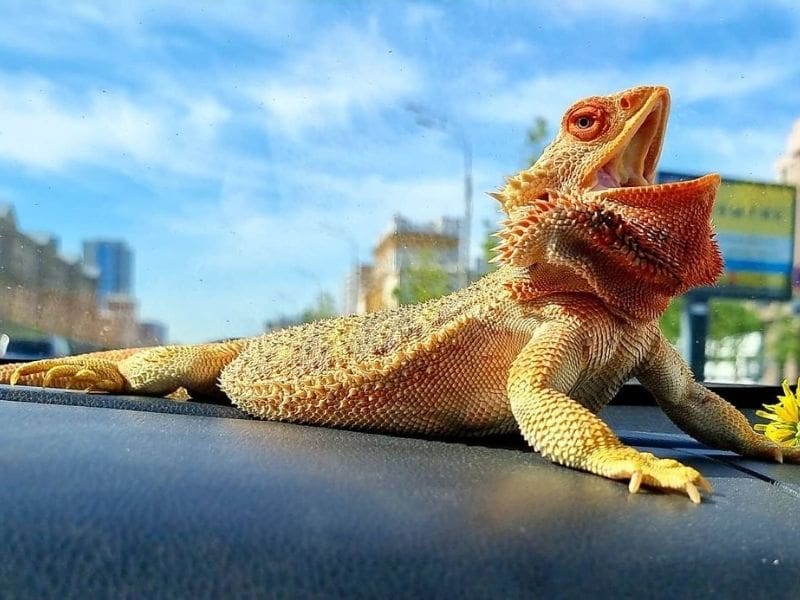Bearded dragons are a popular reptile that people keep as pets. One of the most common questions people have about these animals is why they often open their mouths. This article will answer this question and explain the possible causes and solutions to bearded dragon mouth-opening behavior.
The first cause of a bearded dragon’s mouth gaping is over-feeding your lizard. Bearded dragons can’t vomit, so if they overeat food at once, it will sit in their stomach until it’s digested naturally. This could take days or weeks.
Why does my bearded dragon open his mouth?

Some of the other reasons why your bearded dragons open their mouths include the following:
1. Temperature regulation
Bearded dragons will often open their mouths to regulate temperature. Bearded dragons use the sun’s rays, absorbed by its body and then radiated as heat. When the bowl is too hot or cold, the bearded dragon will open his mouth wide enough for air currents from the front and bottom of the head to pass over it. This helps cool down or warm up the bearded dragon’s body.
Bearded dragons often close their mouths when they’re in a situation where they need to conserve energy, such as nighttime or during hibernation periods.
Solution
You can help them get cool by misting them with water or providing a hiding place for them where it’s cool. It is important to keep your bearded dragon in an environment that offers both warmth and cooling, as this is essential for healthy living.
2. A sign of aggression
One of the reasons why your bearded dragons open their mouths is to make themselves look more menacing. Bearded dragons are territorial animals, and opening their mouths shows that they are not happy with the current situation – for example, if another bearded dragon enters its territory or when you try to take food away from it.
It can also be used as a sign of aggression towards other animals, such as birds which sometimes fly too close to the bearded dragon’s face in search of insects (its natural prey).
Other signs of aggression include a puffed-up head, hissing, a head-bobbing fast, a black beard, and a tall stance.
Solution
Remove the stimulant from its environment to reduce the level of aggression in the bearded dragon. This can include removing another gecko or simply leaving the bearded dragon alone.
You can reduce aggression in bearded dragons by giving them a small, covered hideout.
You can also reduce aggression in bearded dragons with the help of an animal behaviorist or certified reptile keeper.
Another tip is to provide enough stimulation for your bearded dragon and feed it healthy food.
This will increase its appetite so that you won’t have to take food away from it as often, making the bearded dragon even more aggressive than before.
When you interact with your dragon, avoid making eye contact if possible and be sure not to invade its personal space (around three feet should do). Speak softly when interacting with him, too, so he doesn’t feel threatened.
3. A sign of a respiratory infection
A respiratory infection is one of the most common health issues with bearded dragons, and this is often signified by their mouth being open. Bearded dragon mouths opening up are a clear indicator that there may be an infection in your pet’s respiratory tract or nasal cavity.
If you notice any changes in eating habits, such as leaving food behind after feeding them, then this would also be a good time to bring your pet to the vet for testing.
In addition to breathing difficulties, it can also cause weight loss because your bearded dragon won’t eat much anymore if their throat hurts from coughing/compressing the air out of their lungs.
A big telltale sign that something could be wrong will come when he opens his mouth wide and gulps down huge amounts of air.
Solution
Bearded dragon mouths open as a sign of respiratory infection and should be taken seriously.
You may have caught your bearded dragon’s respiratory infection early if he occasionally only gaping, but it will progress to frequent opening of the mouth without gulping air in if you do not take him to the vet soon enough.
Different treatments can help with this condition, which varies from antibiotics to steroids, depending on the severity.
Your veterinarian might also prescribe fluids for rehydration because frequent breathing difficulties will cause dehydration too. However, invest in proper care before letting any conditions worsen by delaying treatment or ignoring symptoms altogether. This could lead to even more severe health problems like heart failure, which can kill your dragon.
4. Stretching the head
When your bearded dragon stretches his head, it’s almost like he is yawning. Likewise, bearded dragons will often stretch their heads when they feel sleepy and want to take a nap.
However, sometimes your bearded dragon may be opening his mouth for another reason. For example, if you notice that your beardie has an infection or egg-laying problem, then this might not be as innocent of action as initially believed.
In general, if the reptile does have any problems with its health or reproductive system, get him checked out by a veterinarian immediately.
5. Responding to another bearded dragon
Bearded dragons also open their mouths when responding to another bearded dragon. This behavior is called gaping and it’s commonly seen in the wild and captivity.
In these situations, there might not be a physical fight going on. Still, one lizard reacts with aggression to being approached by the other animal or threatened by an object near its territory.
Solution
You can keep your bearded dragon calm by providing them with more space to hide and escape from other animals. Bearded dragons are also territorial creatures, so you can provide a place for your lizard to mark its territory by spraying it down with urine or allowing them access to plants that they enjoy chewing on.
If the gaping behavior persists despite these measures, there may be another problem like stress or illness.
6. It’s a mating sign
If you see a bearded dragon holding its mouth open, it could be mating. Bearded dragons open their mouths as a sign of mating, so if you see one opening and closing its mouth while looking at the opposite sex, it could be that they’re waiting for an “ok” from the other bearded dragon to go in for the mating.
If your female beardie keeps her mouth closed during breeding time with another male beardie, then she might not want anything to do with him. But, on the flipside, males will often use this gesture even if he’s out of season or courting someone who is already mated because sometimes all he needs is eye contact before going in for the mating.
Other signs of mating in bearded dragons include the male circling the female, bobbing his head up and down, or going in for a “kiss”. If you see any combination of these signs, don’t worry since the dragon is just in season.
7. Overfeeding
When you overfeed your bearded dragon, he will open his mouth. Bearded dragons are omnivores which means they eat both plants and animals for food, though their diet should consist of primarily insects that you feed them live to mimic the conditions in nature where they hunt prey. Too much of any part of their diet will lead to the gaping.
Beardies are also among pets that don’t show great control of their diet. They’re likely to eat almost anything you serve them, easily leading to an overweight bearded dragon.
Solution
When your bearded dragon has overeaten at one sitting or over time due to overeating or eating a spoiled bug (dead bugs can make him sick), it may open her mouth.
This can also be due to feeling hungry again because the stomach is empty but there’s nothing left to digest from previous meals.
This behavior might also be triggered by stress as well so if this continues after giving all other factors another chance; I recommend consulting with a reptile vet.
Other signs of an overfed bearded dragon
- Lethargy due to the lethargic state of digestion.
- Gasping for air as they try and get more oxygen since their metabolism is slowed down from overeating food.
- They might also have a bloated stomach, which can be uncomfortable or painful.
Be sure you observe him after feedings to make sure he’s not showing any signs that would indicate overfeeding, such as an open mouth holding his tongue out when looking at her reflection in the mirror or trying to move it from side to side with her nose pointed up if she doesn’t feel well.
Any of these cases can lead to your bearded dragon opening its mouth. As you may have noted, some instances are harmless, while others need your attention and that of the vet. If you’re close to your pets (as you should be), you will easily notice it.
READ NEXT: Bearded Dragon Noises and What They Mean

